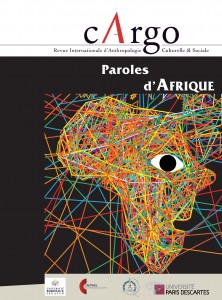Coordinated by Jean derived (PU Emeritus, University of Chambéry) and Cécile Leguy (PU Université Sorbonne Nouvelle, Paris 3).
The symposium which are issues the contributions published in the fourth issue of cArgo was held from 10 to December 15, 2012 in Bordeaux, on the sidelines of an exhibition dedicated to African words presented in October 2012 to may 2013 by the Museum of Ethnography of Bordeaux (SEM), curated by Sandra Bornand and Cécile Leguy, in partnership with the UMR language, languages and Cultures d'Afrique Noire (LLACAN). The title of this record thus took to the theme of the Symposium: African lyrics. Between traditions and mutations. It was composed of two main areas that correspond to the two sections which structure the folder, the second is itself divided into two parts. The first axis concerns the endogenous representations of the exercise of the floor. It is known that African societies attach a particular importance to the floor. The notion of "African word", however, is the subject of a large number of shots in the West, the one is there is a heritage floor, frozen in directories and immutable gender, words ritual and magic to the ruthlessly efficient, words of praise for the powerful by their cronies statutory, or even to talk wordy to infinity under the tree of the same name… These snapshots are revisited here by specialists who are also researchers from land, to enrich and refine the knowledge on verbal communication in Africa in all its complexity.
Knowledge of the mechanisms that govern language practices is an essential condition for a better understanding of cultural but also political and economic issues of contemporary situations. New media used unpublished heritage speech developments, by investing new fields of speech (political, economic…) so that expanding the hearing up to touch an inter-ethnic, all public by allowing the communities neo-urbaines continue to have a link with their language and their culture of origin, even if it is in a form slightly different from that of the rural context. The second axis of this record is so devoted to the use of the word for new modalities and new goals.
Download the full issue of Cargo #4 Africa lyrics
Introduction, Jean derivative and Cécile little [Télécharger]
1st part: the endogenous representations of the exercise of the floor
The word in Fulani culture: concepts practical performances.
by Christiane Seydou [Télécharger]
The handling of the floor: an art of living at the RCA Gbaya.
by Paulette Rathore-Doko [Télécharger]
The word in Mandinka culture: the example of the Kong Dioula (Côte d'Ivoire).
by Jean drift [Télécharger]
Some thoughts, as a balance, on Aboriginal representations of speech in Africa.
by Jean drift [Télécharger]
2nd part: the use of the word heritage
The traditional floor in new media
Oral literature and new media: the example of Verba Africana.
by Daniela Merolla [Télécharger]
The evolution of the word heritage Hausa in new media contexts: the example of the wanderings of the traditional pattern of a tale-type theatre, book and video.
by Graham Furniss [Télécharger]
The recovery of the heritage floor for new purposes in modern Africa
The role of the cisungu in the region speak bemba in Zambia.
by Anne-Marie Dauphin-Teo [Télécharger]
Reference to the heritage floor in the advertising slogans in Senegal.
by not Robin Sega Touré [Télécharger]
Critical notes
Anna M. Diagne, Sascha Kessler and Christian Meyer (eds.), wolof Communication and Senegalese society. Heritage and creation, Paris, L'Harmattan, Collection African Studies, 2011 by Jean Copans, Université Paris Descartes / CEPED [Télécharger]
Sandra Bornand and Cécile Leguy, anthropology of language practices, Paris, Armand Colin, 2013 by Katell Morand, University Paris Ouest Nanterre [Télécharger]
Daniela Merolla, Jan Jansen and Kamal Nait-Zerras (eds.), Multimedia research and documentation of oral genres in Africa: the step forward, Zürich, reads Verlag, 2012 by Maria Teixeira, University Denis Diderot – Paris 7 / ECEVE[Télécharger]
Jean derived, the art of the verb in the African oral tradition, Paris, L'Harmattan, 2012 by Cécile Leguy, Université Sorbonne Nouvelle – Paris 3 / LACITO [Télécharger]
Ursula Baumgardt (eds.), Representations of otherness in the African oral literature, Paris, Karthala, 2014 by Paulette Rathore-Doko, INALCO / LLACAN [Télécharger]
Claude Calame, Florence Dupont, Bernard Lortat-Jacob and Maria Manca (eds.), the recorded voice. For a new ethnopoetique, Paris, Éditions Kimé, 2010 by Alice Degorce, IMAF / IRD [Télécharger]

